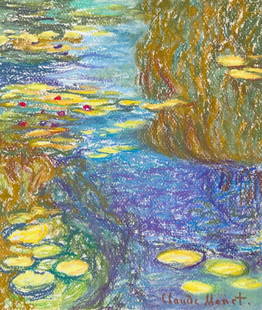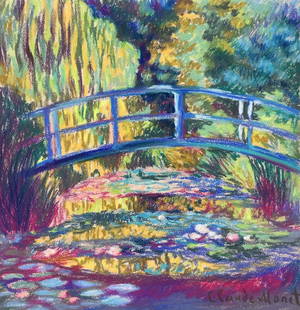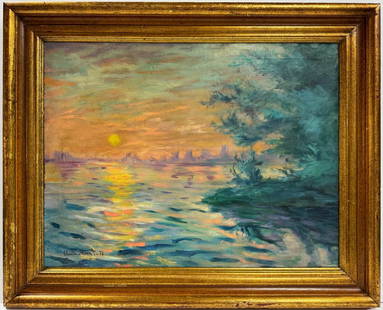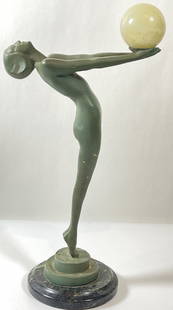
After Claude Monet French (1840-1926) Pastel
Similar Sale History
View More Items in Paintings


Related Paintings
More Items in French Paintings
View MoreRecommended Art
View More








Item Details
Description
Featuring a study of lily pads in evening light - Attributes: Signed on the lower left, with gallery stamp on verso. After Claude Monet - Media: Pastel on paper - Condition: Good condition - Provenance: Private collection, Northern Europe - Dimensions (cm): 28.1 by 15.6 - Dimensions (inches): 11 by 6 - Biography: Claude Monet is one of the most well known painters in the history of art and a top figure in the impressionist movement, his works can be seen in various museums across the world. Claude Monet grew up in Le Havre, a port town in the Normany Region and was known to be a respectful student, however, he did not enjoy being confined to the boundaries of a classroom. Monet would rather enjoy his time in the outdoors. When he was young he established a passion for drawing. Monet had schoolbooks covered in sketches of other people he drew and caricatures of his teachers. His mother supported his passion for art, although his father would have preferred him to go into business. Monet went through a severe grieving period after the death of his mother in 1857. Monet was recognized in the community for his caricatures and drawings of several town folk. When he met Eugene Boudin in 1858, he became encouraged to paint the outdoors. The outdoors or plein air painting is the foundation of Monet's work. In 1859, he moved to Paris to further pursue his art. He was influenced heavily by the paintings of the Barbizon school and enrolled as a student at the Academie Suisse. As he was studying in Paris, he met with another artist, Camille Pissaro, who was a close friend for several years. From 1861 to 1862, Monet was part of the military but was released for health reasons. He later returned to Paris and studied with Chales Gleyre. Through Gleyre, Monet was introduced to many other artists that included Auguste Renoir, Alfred Sisley and Frederic Bazille. These four artists all became friends. Monet received advice and support from Johann Barthold Jongkind, who was a landscape painter and a major influence on Monet. He loved to work outdoors and was sometimes joined by Renoir, Sisley and Bazille on these painting journeys. In 1865, Monet had two paintings of marine landscapes chosen to be displayed in the Salon of 1865, an annual juried art show in Paris. His work received critical praise, although he still experience financial difficulty. The year after, 1866, Monet was chosen again to partake in the Salon art show. The show officials selected a landscape and a portrait Camille (also known as Woman in Green) portraying his lover and future wife, Camille Doncieux. Doncieux assisted Monet by being a muse, sitting for several paintings throughout her life. In 1867, after birth of their first son Jean, Monet was in severe financial hardship and his father refused to assist. Monet became very depressed in this situation and in 1868 attempted to commit suicide by drowning in the Seine River. Luckily, Monet and Camille caught a break, after Louis-Joachim Guadibert became a patron of Monet's work. This allowed Monet to continue his art and have the proper care for his family. Monet and Camille married in June 1870, and after the Franco-Prussian War the couple fled with their son to London, England. In London, Monet met Paul Durand-Ruel, who was his first art dealer. Monet returned to France in 1872 after the war, settling in Argenteuil, an industrial town, and started his own technique. In Argenteuil, Monet visited with his art friends including Renoir, Pissarro and Edouard Manet. Manet, according to an interview, first disliked Monet as their names would often get mistaken. Monet alongside his fellow artists, helped develop the Societe Anonyme des Artistes, Peintres, Sclupteurs, Graveurs, as an substitute to the Salon and exhibited their works together. Monet would sometimes get frustrated with his work, some reports estimate that he destroyed up to 500 works. He would burn, cut or kick the piece. Alongside this frustration and anger, he would
Buyer's Premium
- 22%
After Claude Monet French (1840-1926) Pastel
Estimate $2,500 - $3,500
Shipping & Pickup Options
Item located in Aurora, caSee Policy for Shipping
Payment

Related Searches
TOP















































































